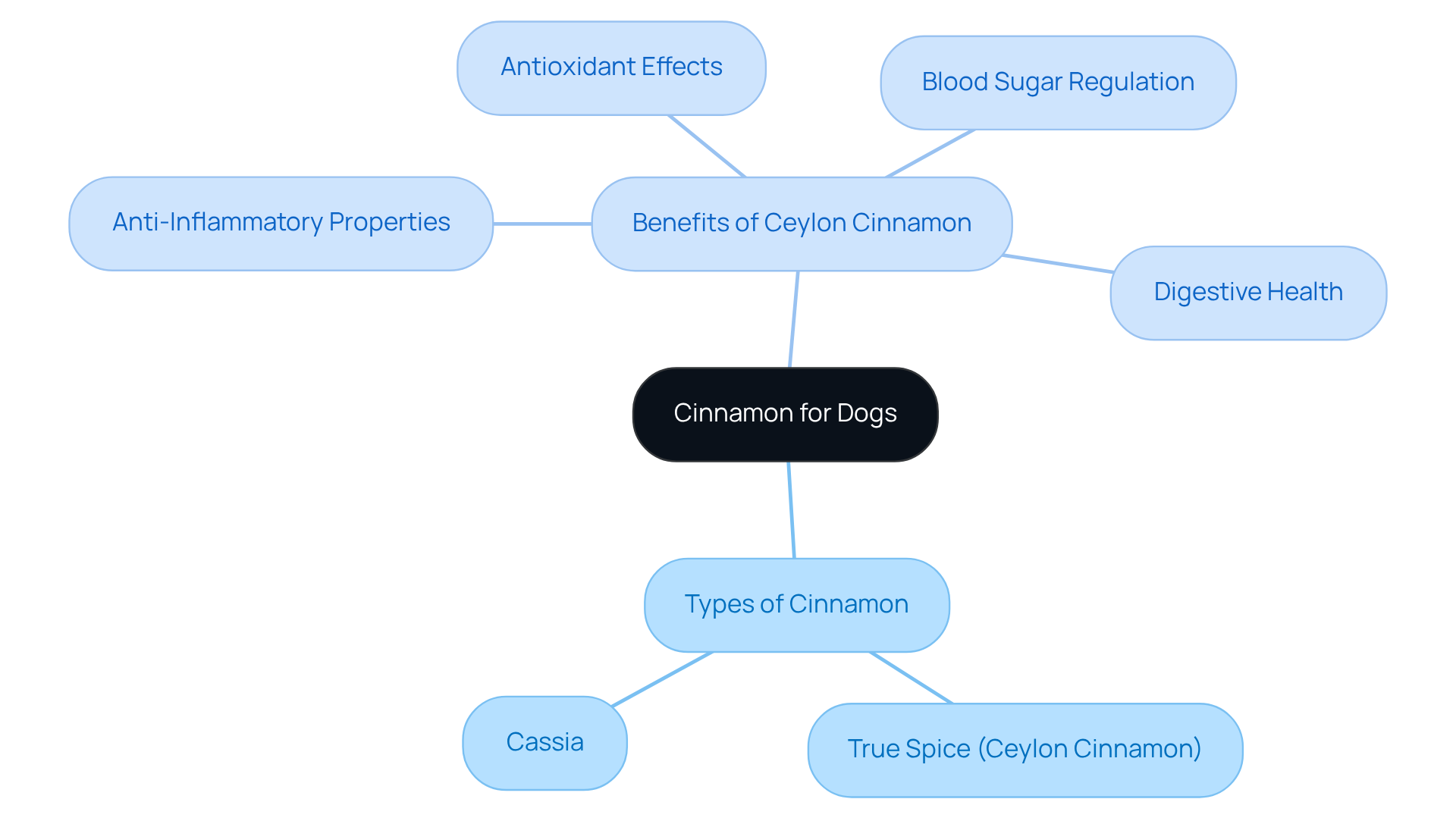Cinnamon for Dogs: Safe Feeding Practices and Benefits
Overview
Cinnamon, especially the Ceylon variety, can be a safe and beneficial addition to your furry family members’ diets. It boasts lower coumarin levels and offers various health benefits, such as anti-inflammatory properties and improved digestion. However, it’s essential to approach this with care. Moderation is key, and consulting with your veterinarian can help prevent any potential risks, including allergic reactions or toxicity from excessive amounts.
As pet owners, we understand your desire to provide the best for your pets. At Adventure Den, we encourage you to explore the wonderful benefits of cinnamon while ensuring your pets’ safety. Remember, a nurturing environment is crucial for their well-being. Always prioritize their health by discussing any dietary changes with your vet.
By taking these steps, you can confidently introduce cinnamon into your pets’ lives, knowing you’re making a thoughtful choice for their health and happiness.
Introduction
Cinnamon, a cherished spice celebrated for its rich flavor and delightful aroma, offers fascinating potential benefits for our furry family members when thoughtfully incorporated into their diets. This wonderful spice can enhance canine health by providing anti-inflammatory and antioxidant properties. However, as loving pet owners, it’s essential to navigate the nuances of safety and dosage to avoid any potential risks.
How can we strike the right balance between harnessing cinnamon’s advantages and ensuring the well-being of our beloved companions? This guide explores safe feeding practices and the health benefits of cinnamon for dogs, equipping you with the essential knowledge needed for a nurturing approach.
Understand Cinnamon: Types and Benefits for Dogs
Spice, derived from the bark of Cinnamomum trees, comes in two main varieties: one often called ‘true spice’ and Cassia. When it comes to our furry family members, Sri Lankan spice is generally considered the safer option due to its lower coumarin levels, which can be harmful in large amounts. However, it’s essential to remember that even this spice, when consumed excessively, can lead to health issues such as vomiting and diarrhea.
Benefits of Ceylon Cinnamon for Dogs:
- Anti-Inflammatory Properties: This spice can help reduce inflammation, making it especially beneficial for pets suffering from arthritis or joint discomfort.
- Antioxidant Effects: Rich in antioxidants, this spice combats oxidative stress and supports overall well-being in dogs.
- Blood Sugar Regulation: It may assist in managing blood sugar levels, offering potential benefits for diabetic dogs.
- Digestive Health: This spice promotes healthy digestion and can help ease issues like gas and bloating.
As you consider adding cinnamon for dogs to your dog’s diet, it’s crucial to acknowledge these benefits and select the appropriate variety. When used in moderation, cinnamon for dogs can enhance your dog’s well-being while minimizing health risks associated with other types. Additionally, spice sticks are not recommended for dogs due to the choking hazard they pose. Always consult your veterinarian before introducing new spices into your dog’s diet, ensuring a nurturing environment for your beloved pet.

Assess Safety: Risks and Toxicity of Cinnamon for Dogs
While this spice can provide some advantages, it’s crucial to evaluate the safety of cinnamon for dogs when considering its use for your furry family members.
- Coumarin Content: Cassia spice contains elevated levels of coumarin, which can be harmful to canines if consumed in large quantities. For a safer option, cinnamon for dogs is generally recommended as Ceylon spice due to its lower coumarin levels, making it a better choice for your dog’s diet.
- Allergic Reactions: Some canines may experience allergic responses to certain spices, manifesting as itching, swelling, or gastrointestinal distress. Though food allergies in dogs are uncommon, they can occur with repeated exposure. It’s vital to observe your pet for any negative reactions when introducing new foods, ensuring their comfort and health.
- Dosage Guidelines: Dosage guidelines indicate that a safe daily amount of cinnamon for dogs typically ranges from 1/8 to 1/4 teaspoon, depending on your dog’s size. However, half a teaspoon of cinnamon for dogs can offer health benefits while reducing potential risks. This moderate dosage allows your dog to enjoy the spice safely.
- Signs of Toxicity: Excessive intake of this spice may lead to symptoms such as vomiting, diarrhea, lethargy, coughing, choking, and difficulty breathing. If you notice any of these signs, it’s essential to consult a veterinarian promptly for your pet’s safety.
Always seek veterinary advice before adding new foods or spices to your dog’s diet. Your pet’s well-being is our top priority, and we’re here to help you create a nurturing environment for your beloved companion.

Incorporate Cinnamon: Guidelines for Safe Feeding Practices
Incorporating cinnamon into your furry family member’s diet can be a safe and beneficial choice when you follow these caring guidelines:
Safe Feeding Practices:
- Start Small: Begin with a pinch of cinnamon mixed into their food to gently gauge your dog’s reaction. This small step helps ensure a positive experience.
- Mix with Food: Blend the spice into your dog’s regular meals or homemade treats. This not only helps mask its flavor but also makes it more enjoyable for your pet.
- Monitor Reactions: Keep a watchful eye on your dog for any signs of allergies or digestive distress, such as vomiting or diarrhea, after introducing cinnamon. Your attentiveness is key to their well-being.
- Use Sparingly: Limit cinnamon intake to a few times a week instead of daily. This approach minimizes the risk of toxicity and digestive issues. For dogs weighing over thirty pounds, it’s wise to keep the intake to less than a teaspoon per day.
- Consult Your Vet: Always reach out to your veterinarian before making significant dietary changes, especially if your dog has pre-existing health issues or is on medication. Smaller dog breeds are particularly sensitive to larger amounts of certain spices, so extra caution is essential.
By following these nurturing guidelines, you can enhance your dog’s diet with the potential benefits of cinnamon, such as improved digestion and better blood sugar control, all while prioritizing their overall wellness. Studies indicate that canines given cinnamon exhibited considerably lower systolic blood pressure and heart rates compared to those who did not receive the spice. However, it’s crucial to monitor your dog’s health closely, as excessive consumption can lead to liver damage, underscoring the importance of controlled intake. Remember, your furry family members deserve the best care possible.

Address Concerns: FAQs About Cinnamon and Dogs
Here are some frequently asked questions regarding cinnamon and dogs:
FAQs About Cinnamon and Dogs:
-
Is it safe for all canines to consume spice?
- Most dogs can safely enjoy cinnamon in moderation, especially the Ceylon variety, which is milder and contains lower coumarin levels. However, it’s always best to consult your veterinarian before introducing it into their diet. Remember, some dogs may have allergic reactions or experience respiratory irritation.
-
What if my dog consumes too much spice?
- If your dog happens to consume more than a teaspoon of cinnamon, keep an eye out for symptoms like vomiting, diarrhea, or signs of low blood sugar. If any negative reactions occur, prompt veterinary consultation is essential, as excessive amounts can lead to serious health issues.
-
Is this spice safe for puppies?
- It’s advisable to hold off on giving cinnamon to puppies until they are older. Their digestive systems are still developing, and they may not handle spices well just yet.
-
Can this spice assist with my dog’s unpleasant breath?
- Yes, indeed! Cinnamon for dogs has natural antibacterial properties that can aid in freshening your dog’s breath. It could be a delightful addition to their diet in small amounts.
-
What are some recipes using spice suitable for canines?
- You can whip up homemade cinnamon-flavored dog treats by combining cinnamon with oats, peanut butter, and pumpkin. Just be sure to keep the total cinnamon content within safe limits for your dog’s size. For small canines, no more than 1/8 teaspoon should be used; medium-sized canines can enjoy up to 1/4 teaspoon, while large canines should not exceed 1/2 teaspoon occasionally.
These FAQs aim to provide clarity and support for pet owners considering cinnamon as a dietary addition for their beloved furry family members. Remember, moderation and veterinary guidance are key to ensuring the health and happiness of your pets.

Conclusion
Incorporating cinnamon into your furry family member’s diet can offer a range of health benefits, but it requires careful consideration and responsible practices. It’s essential to remember that while Ceylon cinnamon can be a nutritious addition, prioritizing safety is vital. Adhering to recommended dosages and monitoring for any adverse reactions ensures your pet’s well-being.
Cinnamon boasts several key benefits, including:
- Anti-inflammatory properties
- Antioxidant effects
- Potential to aid in blood sugar regulation
- Digestive health
Choosing the right type of cinnamon is crucial to minimize risks associated with coumarin content, especially with Cassia cinnamon. Following safe feeding practices serves as a roadmap for pet owners to introduce this spice thoughtfully and effectively.
Ultimately, the well-being of your dogs should always come first. By consulting a veterinarian and following the outlined guidelines, you can safely explore the advantages of cinnamon for your beloved companions. This proactive approach not only enhances your dog’s diet but also fosters a nurturing and health-conscious environment that ensures their happiness and longevity.
Frequently Asked Questions
What are the two main varieties of cinnamon?
The two main varieties of cinnamon are often referred to as ‘true spice’ (Ceylon cinnamon) and Cassia.
Which type of cinnamon is safer for dogs?
Sri Lankan spice, or Ceylon cinnamon, is generally considered the safer option for dogs due to its lower levels of coumarin, which can be harmful in large amounts.
What health issues can arise from excessive cinnamon consumption in dogs?
Excessive consumption of cinnamon can lead to health issues such as vomiting and diarrhea in dogs.
What are the benefits of Ceylon cinnamon for dogs?
The benefits of Ceylon cinnamon for dogs include anti-inflammatory properties, antioxidant effects, blood sugar regulation, and promoting digestive health.
How does Ceylon cinnamon help with inflammation in dogs?
Ceylon cinnamon can help reduce inflammation, making it beneficial for pets suffering from arthritis or joint discomfort.
Can Ceylon cinnamon assist diabetic dogs?
Yes, Ceylon cinnamon may assist in managing blood sugar levels, offering potential benefits for diabetic dogs.
Is it safe to give cinnamon sticks to dogs?
No, cinnamon sticks are not recommended for dogs due to the choking hazard they pose.
Should I consult a veterinarian before adding cinnamon to my dog’s diet?
Yes, it is important to consult your veterinarian before introducing new spices into your dog’s diet to ensure their safety and well-being.







